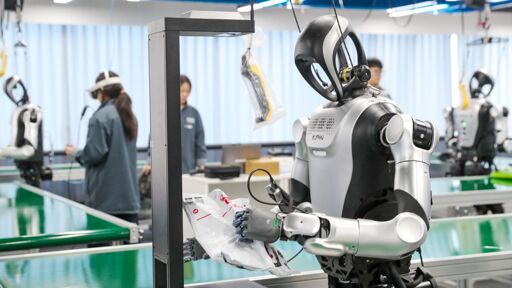☆ Yσɠƚԋσʂ ☆
- 1.57K Posts
- 1.58K Comments

 11·24 hours ago
11·24 hours agoAbsolutely hilarious how US companies bet the farm on subscription based AI products, and now the whole business model is falling apart. This might be the first time that Silicon Valley is facing direct competition with some new tech it’s developing. And the interesting part here is that they’re facing a different business model, Chinese companies aren’t looking for direct monetization. They’re treating models as shared infrastructure, sort of what we already see happening with Linux. Most companies don’t try to monetize it directly, they build stuff like AWS on top of it and that becomes the product. I expect American companies are just going to run out of runway in the near future because they’re getting squeezed by open Chinese models which undercut their entire business model.

 4·1 day ago
4·1 day agoThat’s exactly right, the New Deal was the concession to organized and militant labor movement that saved capitalism. No such movement exists today, and therefore there is no organized threat for the current ruling class to worry about. I think it’s also worth noting that the rich absolutely know they’re fighting a class war here. The plutonomy memo from citi group basically lays it all out. It’s kind of ironic that these people have far better understanding of Marxism than most of the western left.

 2·1 day ago
2·1 day agowhat comes next is fascism

 2·2 days ago
2·2 days agoI’ve been thinking the exact same thing actually. I’d love to just have a single device I carry around that I could dock to add more juice and use like a desktop at home.
Incidentally, this would eliminate the need for most cloud hosting services too. If you don’t need to constantly sync data, then you don’t need online services for any of your media. You just need sync when you collaborate with other people. This would afford way more privacy.

 11·2 days ago
11·2 days agoThat’s basically what Sanders was trying to do with the Green New Deal. And apparently, even these minimal and necessary reforms needed to save the system were deemed to be too much by the oligarchs.

 15·2 days ago
15·2 days agoNot gonna happen under the dictatorship of capital.

 7·2 days ago
7·2 days agoAlso kind of true, most people use phones or tablets nowadays. You only really need a laptop if you are creating content. If you’re simply consuming it, then you just need a screen.

 11·2 days ago
11·2 days agoI bet that overall percentage of people who actually connect this with AI or even really care is tiny. Aside from gamers, majority of people don’t really build their own rigs, or upgrade computers constantly.

 7·4 days ago
7·4 days agoI’m not really sure what critical areas China needs to catch up in at this point. The chips they produce are already good enough for any practical applications. It’s also worth keeping in mind that improving software is much easier than hardware. Western software stacks are incredibly bloated. For example, Huawei starting fresh with their HarmonyOS can make a much leander stack by cutting all the cruft and backwards compatibility out.
I also don’t see China being decades behind in chips. They can already make 7nm, they’re prototyping EUV machines, it’s not going to be long at this point. On top of that, China is investing into research of alternative substrates like graphene, spintronics, etc. Any one of these could make silicon look like vacuum tubes overnight if they can scale them up to mass production. There’s no new fundamental physics that need to be discovered here, we know these these things work in a lab. It’s just a matter of scaling up production. And that’s precisely where state driven development comes in.
Can you explain what this tide of reversal you’re talking about with BRI? Last I looked, the investment is record high https://www.scmp.com/economy/china-economy/article/3340442/china-signs-record-us213-billion-new-belt-and-road-deals-2025-report
The Epstein files are the biggest scandal the western system has faced to date in my opinion. This is bigger than stuff like Watergate because it spans multiple administrations in the US, as well as other western regimes. It’s a total indictment of the idea that there’s any sort of a democracy in the west. It’s now plain for everyone to see that the west is ruled by diabolical monsters who are accountable to no one. And this comes at a time of a rapid decline in the living standards which makes people angry and politically engaged. Things that might’ve been ignored before cannot be ignored any longer.
Finally, it seems to me that the west is headed for a massive financial crash. While people keep playing games with the numbers, it’s pretty clear that all the tangible metrics like job numbers and cost of living are doing very poorly. The only question in my mind is what the catalyst will be. It could be the coming war with Iran which might drive oil prices through the roof.

 11·5 days ago
11·5 days agoThere might actually be a direct relationship there as well. Taiwan being the chokepoint for western chip production puts them in a perfect position to insert backdoors into all western tech. There’s a reason the US was freaking out over Huawei tech spreading in the west. The problem with it isn’t that there’s some Chinese malware in it, but rather that western agencies can’t use it for spying.

 4·6 days ago
4·6 days agoZulip pretty easy to self host. I ran a server for a group of friends a little while back, and it worked great. The UI takes a bit of getting used to, but it is great once you do because everything is a thread by default. And that makes it really easy to catch up on things.

 24·7 days ago
24·7 days agoIt’s all a matter of jurisdiction. Open source platforms like Stoat can be run outside the reach of western regimes.

 1·8 days ago
1·8 days agoNot that I’ve seen.

 1·8 days ago
1·8 days agonot much, just slightly different UX

 2·8 days ago
2·8 days agoI honestly kinda prefer older civ games because they were simpler and more focused. For me, Civ3 might really be the peak of the series.

 2·8 days ago
2·8 days agoI’ve seen a few similar projects before, but can’t recall what they were off top of my head.

 4·15 days ago
4·15 days agoI’d expect they will be Linux friendly just because there’s a big push towards using Linux in China now since they want to decouple from western proprietary tech. I guess we’ll have to wait to see once they become generally available though.

 13·21 days ago
13·21 days agoThe level of investment in AI in China is a fraction of that in the US, and they’re already starting to make money. The whole dynamic in China is different. Instead of chasing unicorns and promising stuff like AGI, companies in China are treating AI as shared infrastructure that you actually build useful stuff on top of. Hence why models are being released as open source, they’re not seen as the key source of revenue. It’s closer to what we see with Linux based infrastructure where companies build services like AWS on top of Linux. China also has far more application for AI in stuff like robotics, manufacturing, and other types of automation. There are simply more niches to apply this tech in than there are in the west that’s largely deindustrialized now.

 2·21 days ago
2·21 days agoCan you tell me what sources you two are asking for? My argument is that economies of scale make new technologies cheaper over time because industrial processes become refined, people learn better and cheaper ways to produce things, and scaling up production brings the cost down. What are you asking me to source here specifically?

















plenty https://www.made-in-china.com/manufacturers/hdd.html